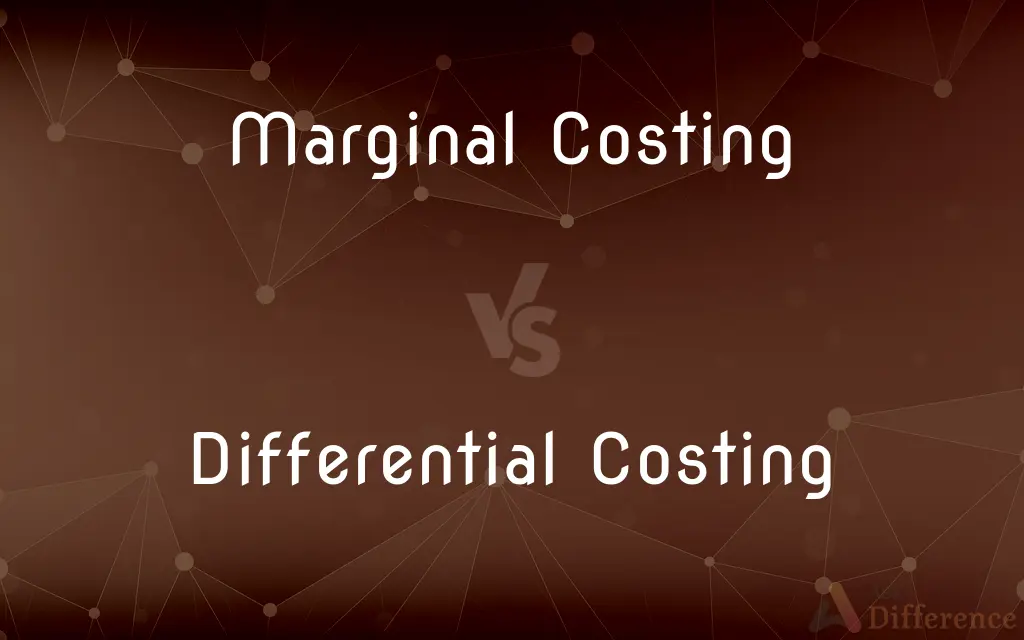Marginal Costing vs. Differential Costing — What's the Difference?
By Tayyaba Rehman — Published on November 22, 2023
Marginal Costing considers the change in total cost due to producing additional units. Differential Costing evaluates the difference in total cost under two alternative decisions.

Difference Between Marginal Costing and Differential Costing
Table of Contents
ADVERTISEMENT
Key Differences
Marginal Costing is essentially a costing technique where only variable costs are charged to the cost units, and the fixed costs are treated as a whole and written off against the aggregate contribution of those cost units. It fundamentally pertains to the additional cost incurred by producing one extra unit of output. In contrast, Differential Costing is a more versatile technique, focusing on identifying and estimating the change in total cost that results from making different decisions.
In practical scenarios, Marginal Costing is often utilized to assist managers in making short-term production decisions or determining the least production level to prevent losses. In contrast, Differential Costing provides a wider analytical frame, assisting decision-makers in understanding the financial implications of alternative paths, which might involve decisions regarding product lines, operations, or processes.
Marginal Costing is tightly bound to volume of production, wherein the marginal cost, defined as the cost to produce one additional unit, is typically constant per unit, assuming variable costs are consistent. Conversely, Differential Costing isn’t bound by per unit analysis but is engaged when comparing any two decision alternatives, irrespective of the volume differential.
Marginal Costing’s utility shines in its simplicity and direct correlation with production levels, providing a clear view for production decisions and break-even analysis. However, Differential Costing sprawls across various decision-making scenarios, offering a comprehensive perspective on cost differentials amongst different strategic options.
Marginal Costing is pivotal for organizations in maintaining profitable operations, especially in determining pricing strategies in competitive markets. On the other hand, Differential Costing finds its place in strategic management, assisting leadership in analyzing various possible paths and choosing one that aligns with organizational goals and objectives.
ADVERTISEMENT
Comparison Chart
Primary Use
Short-term production decisions
Strategic decisions
Cost Considered
Variable costs
All relevant costs
Application
Per unit production
Any two alternatives
Decision Scope
Generally operational
Can be strategic
Relationship with Volume
Direct
Not necessarily direct
Compare with Definitions
Marginal Costing
Used predominantly for short-term decisions.
The firm applied marginal costing to navigate through the seasonal production spike.
Differential Costing
Not tied to per unit production.
Differential costing was applied to overall project costings, not per unit.
Marginal Costing
Analyzes the cost of producing one additional unit.
The company utilized marginal costing to price the additional units produced.
Differential Costing
Considers all relevant costs in alternatives.
Differential costing highlighted cost variances between the two project paths.
Marginal Costing
Directly associated with production volume.
The marginal costing revealed a steady cost per additional unit produced.
Differential Costing
Applicable across various decision-making scenarios.
The differential costing method supported both operational and strategic choices.
Marginal Costing
Primarily considers variable costs.
Marginal costing helps in scrutinizing the effect of variable costs on production.
Differential Costing
Can influence strategic and operational decisions.
Differential costing provided insights that shaped the firm's strategic direction.
Marginal Costing
Focuses on operational level decisions.
Through marginal costing, the manager determined the optimal production quantity.
Differential Costing
Encompasses the cost difference between decision alternatives.
The CEO used differential costing to analyze potential expansion strategies.
Common Curiosities
What’s the focal point of marginal costing?
Marginal costing focuses on the cost of producing one additional unit.
Are fixed costs considered in marginal costing?
Marginal costing typically considers only variable costs per unit.
Is marginal costing used for long-term decisions?
No, marginal costing is typically used for short-term decisions.
What does marginal costing reveal about production costs?
It reveals the cost incurred to produce one additional unit.
What type of costs does differential costing consider?
Differential costing considers all relevant costs between two alternatives.
Is marginal costing useful in pricing strategies?
Yes, marginal costing can influence pricing of additional units produced.
Can differential costing be used for operational decisions?
Yes, differential costing can be used for both operational and strategic decisions.
In what scenarios is differential costing applied?
Differential costing is applied in scenarios involving different decision alternatives.
How does differential costing support strategic management?
It provides a cost comparison between different strategic alternatives.
Can differential costing help in budget preparation?
Yes, it can provide insights into cost implications of various budget scenarios.
Does differential costing pertain to unit-level production?
Not necessarily, it pertains to any two decision-making alternatives.
What type of costs are ignored in marginal costing?
Fixed costs are generally excluded from per-unit analysis in marginal costing.
Is marginal costing relevant in competitive market scenarios?
Yes, it’s often used to determine optimal pricing in competitive markets.
Can marginal costing assist in break-even analysis?
Yes, it can help determine the level of production needed to avoid losses.
Is differential costing confined to analyzing production processes?
No, it can be applied to various decision areas, not just production.
Share Your Discovery

Previous Comparison
Soft Skills vs. Technical Skills
Next Comparison
Sources vs. ResourcesAuthor Spotlight
Written by
Tayyaba RehmanTayyaba Rehman is a distinguished writer, currently serving as a primary contributor to askdifference.com. As a researcher in semantics and etymology, Tayyaba's passion for the complexity of languages and their distinctions has found a perfect home on the platform. Tayyaba delves into the intricacies of language, distinguishing between commonly confused words and phrases, thereby providing clarity for readers worldwide.
















































